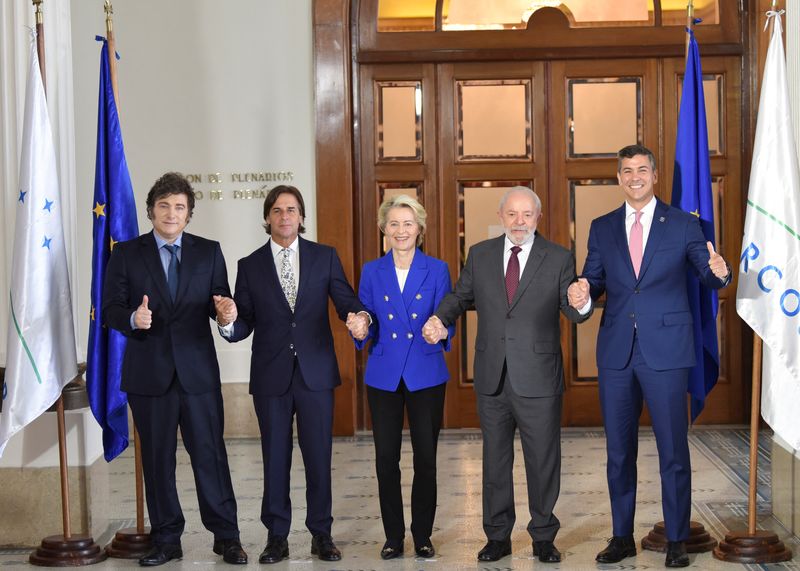By Lucinda Elliott, Lisandra Paraguassu and Philip Blenkinsop
MONTEVIDEO/BRUSSELS (Reuters) – The European Union and South America’s Mercosur bloc dragged a long-delayed free commerce deal over the road on Friday, asserting an settlement – at the very least in precept – on the pact that has deeply divided nations in Europe.
In a press convention in Montevideo, European Fee President Ursula von der Leyen and her Mercosur counterparts heralded the deal after 25 years of talks, citing the necessity free of charge commerce within the face of rising protectionism globally.
“This agreement is not just an economic opportunity, it is a political necessity,” von der Leyen mentioned. “I know that strong winds are coming in the opposite direction, towards isolation and fragmentation, but this agreement is our near response.”
European officers and proponents of the deal say that it provides a approach to cut back reliance on commerce with China in addition to insulating EU nations from the affect of doubtless commerce tariffs being threatened by U.S. President-elect Donald Trump.
The commerce settlement is nevertheless simply the beginning of what may very well be a prolonged endgame to show it right into a actuality. It must be legalized, translated after which authorized by member nations, and will even be blocked, with France the fiercest opponent.
A brief press convention in Montevideo itself underscored a few of challenges. Solely von der Leyen and Uruguayan President Luis Lacalle Pou spoke, with no questions taken after. The presidents of Brazil, Argentina and Paraguay sat in silence.
“Only two of the five spoke and no questions were taken. That in itself, speaks volumes,” mentioned an EU supply carefully concerned within the talks.
“This came out but it came out, but by the skin of its teeth… At least we have the association agreement, the rest will keep playing out in the coming days.”
With negotiators racing towards time and pushback towards the deal at house, von der Leyen had made a late name to fly in for the summit of Mercosur, which incorporates farming powerhouses Brazil and Argentina in addition to Uruguay and Paraguay.
The settlement noticed amendments made to public procurement, auto buying and selling, and important minerals exports versus a model agreed in 2019. It additionally noticed an annex about environmental measures to defuse South American fears about EU protectionism.
“After more than two decades, we have concluded negotiations on the agreement between Mercosur and the European Union,” Brazilian President Luiz Inácio Lula da Silva wrote on X.
Paraguayan President Santiago Peña acknowledged the deal was an necessary step however cautioned a lot work remained to be carried out. “We have to be very realistic, we have a long way to go,” he instructed Mercosur leaders afterward Friday.
EU FARMERS IN OPPOSITION
France, essentially the most vociferous critic of the deal within the EU, has branded it as “unacceptable”. Underscoring the obstacles it now faces, French Commerce Minister Sophie Primas pledged to withstand its subsequent levels, citing environmental and farming considerations.
European farmers have repeatedly protested towards an EU-Mercosur deal that they are saying would result in low-cost imports of South American commodities, notably beef, that don’t meet the EU’s inexperienced and meals security requirements.
European farm foyer Copa-Coge reiterated its opposition to the deal on Friday and referred to as for protests in Brussels.
Italy mentioned on Thursday there have been no circumstances for signing off on a deal. Poland mentioned final week it opposed the free commerce deal in its present kind.
European inexperienced teams additionally broadly oppose the accord. Pals of the Earth calls it a “climate-wrecking” deal.
Conversely, a bunch of EU members together with Germany and Spain say the deal is important for the bloc because it seems to diversify its commerce after the near-closure of the Russian market and discomfort about reliance on China.
“Spain will work to ensure that this agreement is approved by the majority of the (European) Council because trade openness with our Latin American sister countries will make us all more prosperous and stronger,” Spanish Prime Minister Pedro Sanchez mentioned on X.
EU proponents of the deal see Mercosur as a marketplace for European automobiles, equipment and chemical compounds and a probably dependable supply of vital minerals, resembling battery metallic lithium, required for Europe’s inexperienced transition.
In addition they level to agricultural advantages, given the deal provides higher entry and decrease tariffs for EU cheeses, ham and wine.

The commerce settlement would require approval from 15 of the 27 EU members representing 65% of the EU inhabitants together with a easy majority within the European Parliament.
South American negotiators stay optimistic that the EU will ultimately give its approval and that France will be unable to rally a blocking minority.




